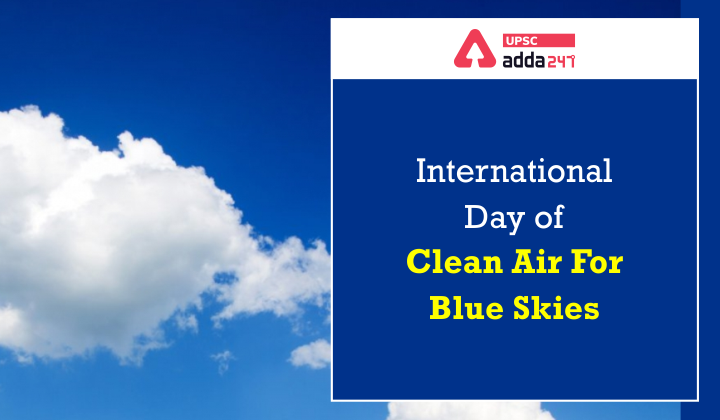Table of Contents
International Day of Clean Air For Blue Skies- Relevance for UPSC Exam
- GS Paper 3: Environment- Conservation, environmental pollution and degradation.
Ozone Pollution: Causes, Impacts and Steps taken to Reduce Ozone Pollution
International Day of Clean Air For Blue Skies- Context
- Recently, while speaking at a public function to mark ‘the International Day of Clean Air For Blue Skies’, the Union Environment Minister has said that the number of cities with “improved air quality” had increased to 104 in 2020 from 86 in 2018.
- He attributed this to the policies of the government.
- On the occasion of the ‘International Day of Clean Air for Blue Sky’, Madhya Pradesh Pollution Control Board directed all the regional officers of the state to organize a public awareness program.
Get free video for UPSC CSE preparation and make your dream of becoming an IAS/IPS/IRS a reality
International Day of Clean Air For Blue Skies- Key Points
- About: International Day of Clean Air For Blue Skies was established by UN resolution in 2019 at the 74th session of the United Nations General Assembly.
- International Day of Clear Air for blue skies raises awareness and facilitates actions to improve air quality.
- First ‘International Day of Clean Air For Blue Skies’: The first event, with the theme “Clean Air for All,” was held on September 7, 2020.
- Second ‘International Day of Clean Air For Blue Skies’: The 2021 theme for the International Day of Clean Air for blue skies is “Healthy Air, Healthy Planet” which emphasizes the health aspects of air pollution, especially considering the COVID-19 pandemic.
- Focus: on prioritizing the need for healthy air for all, while keeping the conversation broad enough to encompass other critical issues such as climate change, human and planetary health as well as the Sustainable Development Goals.
Reciprocal Exchange of Logistics Agreement (RELOS)
Clean Air and Sustainable Development- Steps taken by UN
- United Nations Conference on Sustainable Development: countries committed to promoting sustainable development policies that support healthy air quality in the context of sustainable cities and human settlements.
- 2030 Agenda for Sustainable Development: outlines a road map to achieving sustainable development, environmental protection and prosperity for all.
- It recognizes that air pollution abatement is important to the attainment of the Sustainable Development Goals.




 TSPSC Group 1 Question Paper 2024, Downl...
TSPSC Group 1 Question Paper 2024, Downl...
 TSPSC Group 1 Answer key 2024 Out, Downl...
TSPSC Group 1 Answer key 2024 Out, Downl...
 UPSC Prelims 2024 Question Paper, Downlo...
UPSC Prelims 2024 Question Paper, Downlo...





